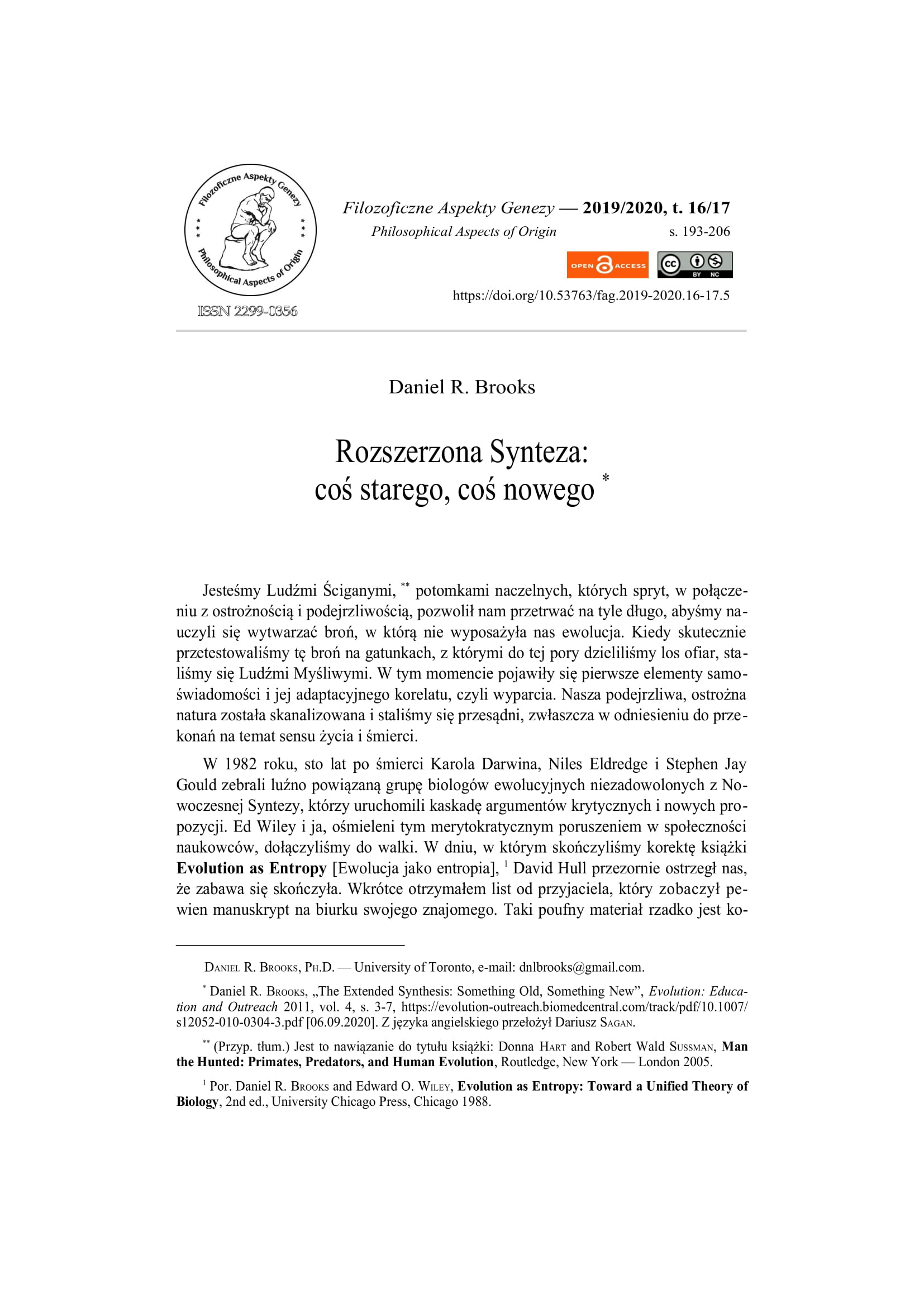
Opublikowane 20.01.2022 — zaktualizowane 23.01.2022
Wersje
- 23.01.2022 - (2)
- 20.01.2022 - (1)
Słowa kluczowe
- rozszerzona synteza,
- neodarwinizm,
- darwinizm,
- złożoność

Utwór dostępny jest na licencji Creative Commons Uznanie autorstwa – Użycie niekomercyjne 4.0 Międzynarodowe.
Jak cytować
Abstrakt
Zaćmienie darwinizmu zaczęło dobiegać końca w latach osiemdziesiątych dwudziestego wieku i obecnie proces ten znajduje się w stanie równowagi. Potrzebujemy Rozszerzonej Syntezy, przy czym termin „rozszerzona” użyty jest tutaj metaforycznie. Musimy cofnąć się w czasie, aby wydobyć ważne aspekty darwinizmu, które odstawiono na boczny tor, a później utracono w okresie panowania neodarwinizmu, i następnie wyjść poza neodarwinizm w celu ujęcia nowych danych i koncepcji. Najogólniejszy układ odniesienia Rozszerzonej Syntezy stanowi koncepcja wielkich przejść ewolucyjnych. Rozszerzona Synteza bez problemu wpisuje się w filozoficzny punkt widzenia, zgodnie z którym biologia nie musi być połączona z innymi obszarami nauki, aby znaleźć dla siebie uzasadnienie. Przekonuje mnie dawniejszy pogląd, że biologia potrzebuje nadrzędnego prawa, które połączy ją z pozostałymi obszarami nauk przyrodniczych. Karol Darwin sugerował istnienie „prawa wyższego rzędu”, ale go nie uściślił. Jeśli uda nam się zidentyfikować to prawo, to Rozszerzona Synteza stanie się Zunifikowaną Teorią Biologii, o której 25 lat temu mówili Daniel Brooks i Ed Wiley.
Downloads
Bibliografia
- Agosta Salvatore J. and Klemens Jeffrey A., Ecological Fitting by Phenotypically Flexible Genotypes: Implications for Species Associations, Community Assembly and Evolution, Ecology Letters 2008, vol. 11, no. 11, s. 1123-1134.
- Baas Pieter, Kalkman Kees, and Geesink Rob (eds.), The Plant Diversity of Malesia, Kluwer, Amsterdam 1990.
- Bowler Peter J., The Eclipse of Darwinism: Anti-Darwinian Evolution Theories in the Decades around 1900, Johns Hopkins University Press, Baltimore 1983.
- Brooks Daniel R., Biological Evolution as a Microcosm of Cosmological Evolution, Bridges 1997, vol. 4, s. 9-35.
- Brooks Daniel R., Diversity, Organismal Level, w: Levin (ed.), Encyclopedia of Biodiversity…, s. 191-207.
- Brooks Daniel R., Entropy, Information and Evolving Biological Systems, Theoria et Historia Scientiarum 1994, vol. 4, s. 31-49.
- Brooks Daniel R., Evolution i informationsåldern: livet får ett eget liv, Carpe Scientia 1999, vol. 2, s. 14-15.
- Brooks Daniel R., Evolution in the Information Age: Rediscovering the Nature of the Organism, Semiosis, Evolution, Energy, Development 2001, vol. 1, s. 1-26.
- Brooks Daniel R., Incorporating Origins into Evolutionary Theory, w: Varela and Dupuy (eds.), Understanding Origin…, s. 191-212.
- Brooks Daniel R., Sagas of the Children of Time: The Importance of Phylogenetic Teaching in Biology, Evolution: Education and Outreach 2010, vol. 3, s. 495-498.
- Brooks Daniel R., Taking Evolutionary Transitions Seriously, Semiosis, Evolution, Energy, Development 2002, vol. 2, s. 6-24.
- Brooks Daniel R., The Mastodon in the Room: How Darwinian Is Neo-Darwinism?, Studies in History and Philosophy of Science Part C: Studies in History and Philosophy of Biological and Biomedical Sciences 2011, vol. 42, no. 1, s. 82-88, doi:10.1016/j.shpsc.2010.11.003.
- Brooks Daniel R., The Nature of the Organism: Life Takes on a Life of Its Own, Proceedings of the New York Academy of Science 2000, vol. 901, s. 257-265.
- Brooks Daniel R., The Unified Theory of Evolution and Selection Processes, w: Van de Vijver, Salthe, and Delpos (eds.), Evolutionary Systems…, s. 113-128.
- Brooks Daniel R., The Unified Theory, Macroevolution, and Historical Ecology, w: Baas, Kalkman, and Geesink (eds.), The Plant Diversity of Malesia…, s. 379-386.
- Brooks Daniel R. and Hoberg Eric P., Darwin’s Necessary Misfit and the Sloshing Bucket: The Evolutionary Biology of Emerging Infectious Diseases, Evolution: Education and Outreach 2008, vol. 1, s. 2-9.
- Brooks Daniel R. and McLennan Deborah A., Biological Signals as Material Phenomena, Revue La Pensee ’Aujourd'hui 1997, vol. 25, s. 118-127.
- Brooks Daniel R. and McLennan Deborah A., Searching for a General Theory of Biological Evolution, The Journal of Ideas 1990, vol. 1, s. 35-46.
- Brooks Daniel R. and McLennan Deborah A., The Nature of the Organism and the Emergence of Selection Processes and Biological Signals, w: Taborsky (ed.), Semiosis, Evolution, Energy…, s. 185-218.
- Brooks Daniel R. and McLennan Deborah A., Phylogeny, Ecology and Behavior: A Research Program in Comparative Biology, University of Chicago Press, Chicago 1991.
- Brooks Daniel R. and McLennan Deborah A., The Nature of Diversity: An Evolutionary Voyage of Discovery, University Chicago Press, Chicago 2002.
- Brooks Daniel R. and Wiley Edward O., Evolution as Entropy: Toward a Unified Theory of Biology, 2nd ed., University Chicago Press, Chicago 1988.
- Cope Edward Drinker, Origin of the Fittest: Essays on Evolution, D. Appleton and Company, New York 1887.
- Darwin Karol, O powstawaniu gatunków drogą doboru naturalnego, czyli o utrzymaniu się doskonalszych ras w walce o byt, przeł. Szymon Dickstein i Józef Nusbaum, Dzieła Wybrane, t. II, Biblioteka Klasyków Biologii, Państwowe Wydawnictwo Rolnicze i Leśne, Warszawa 1959.
- Eldredge Niles, Reinventing Darwin: The Great Debate at the High Table of Evolutionary Theory, Wiley, New York 1995.
- Eldredge Niles, Unfinished Synthesis: Biological Hierarchies and Modern Evolutionary Thought, Columbia University Press, New York 1985.
- Hart Donna and Sussman Robert Wald, Man the Hunted: Primates, Predators, and Human Evolution, Routledge, New York — London 2005.
- Herbert Frank, Diuna, przeł. Marek Marszał, Kroniki Diuny, Dom Wydawniczy REBIS, Poznań 2021.
- Hull David L., Science as a Process: An Evolutionary Account of the Social and Conceptual Development of Science, University Chicago Press, Chicago 1988.
- Levin Simon A. (ed.), Encyclopedia of Biodiversity, vol. 2, Academic Press, New York 2001.
- Maynard Smith John i Szathmáry Eörs, Tajemnice przełomów w ewolucji. Od narodzin życia do powstania mowy ludzkiej, przeł. Michał Madaliński, Wydawnictwo Naukowe PWN, Warszawa 2000.
- Maynard Smith John and Szathmáry Eörs, The Major Transitions in Evolution, W.H. Freeman, Oxford 1995.
- Morgan Thomas Hunt, The Scientific Basis of Evolution, W.W. Norton & Company, New York 1932.
- Simpson George Gaylord, Tempo and Mode in Evolution, Columbia University Press, New York 1944.
- Stocking Jr., George W., Race, Culture and Evolution: Essays in the History of Anthropology, University of Chicago Press, Chicago 1983.
- Szathmáry Eörs, Evolution. Darwin for All Seasons, Science 2006, vol. 313, no. 5785, s. 306-307.
- Taborsky Edwina (ed.), Semiosis, Evolution, Energy: Towards a Reconceptualization of the Sign, Shaker Verlag, Aachen 2000.
- Van de Vijver Gertrudis, Salthe Stanley N., and Delpos Manuela (eds.), Evolutionary Systems: Biological and Epistemological Perspectives on Selection and Self-Organization, Kluwer, Dordrecht 1998.
- Varela Francisco J. and Dupuy Jean Pierre (eds.), Understanding Origin: Contemporary Ideas on the Genesis of Life, Mind and Society, Boston Studies in the Philosophy and History of Science, Reidel/Kluwer Associates, Amsterdam 1992.


